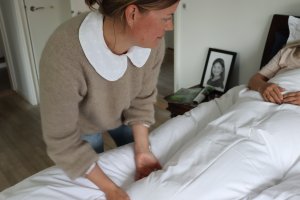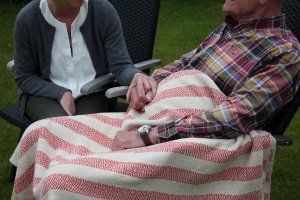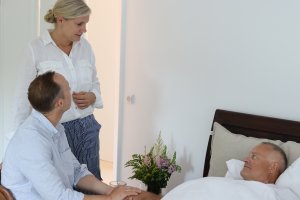In her work as a nurse, Lone sees frequent problems with malnutrition and underweight in the elderly. When she is doing care and reassurance visits as a private nurse, nutrition is something that she considers in her treatment, as good nutrition gives more energy and surplus for the patient. Read here how Lone takes care of her patients’ nutrition.
Avoid underweight in the elderly
There can be many reasons for losing your appetite. Low mood, depression, or pain can make it impossible to function in your home. This makes meals unmanageable. It may also be that you have never cooked yourself and don’t know how to do it after the death of a partner. Lone experiences this with several of her patients.
“Being underweight and lack of appetite is something we nurses often encounter. If a person is alone a lot of the time, is in pain, or is in a low mood, it affects their meals. When I’m with patients for care and reassurance visits, for example, it’s something I keep an eye on and ask about. Then the patient and I can figure out together if and how I should help with that.”
To avoid malnutrition and underweight in her elderly patients, Lone makes sure meals are manageable. “A great way to give them back their appetite is to think ‘little but well’. When I prepare meals, they have to be delicious and cover the whole palette – and lots of vegetables. It’s easier to manage the meal if it’s inviting and consists of a lot of different things.”
Being underweight and lacking in appetite is something we nurses often encounter. If a person is alone a lot of the time, is in pain, or is in a low mood, it affects their meals.
Lone, Privat sygeplejerske
Visits by the same private nurse provide open and honest dialogue about health
“Good nursing care takes into account the whole situation of the patient. It’s not just about the patient eating enough, but also about their mood and physical well-being. Food, body, and mind. If one thing doesn’t work, it often affects the others.” Lone says.
Continuity is one of the ways Lone and her colleagues can take the whole situation into account. Lone elaborates: “The continuity of our visits allows me to better observe the patient’s progress or decline, and thus organize my nursing intervention accordingly. When patients see the same nurse, they feel more comfortable and can talk about their needs. Of course, it’s not easy for everyone to talk about stomach problems, forgetting medicines, pain, or asking for help with different things at home. But once they get to know me, they trust me to handle these things professionally.”
Respect for the individual patient
As with many things, meals, appetites, and food preferences vary widely from person to person. For Lone and the other private nurses, it is always planned with the individual patient in mind.
“It’s very important that in our work with patients we get to know their values and how they prefer to do things. This enables me to provide the best possible professional nursing care according to the needs and wishes of the patients. When I know the patient well and clearly show respect for their home and ways of doing things, nursing becomes more fulfilling. A good and safe working relationship is established and the patient can trust me.”
It's very important that in our work with patients, we get to know their values and how they prefer to do things. This allows me to provide the best possible professional nursing care according to the needs and wishes of the patients.
Lone, Privat sygeplejerske
How a weekly care and reassurance visit can help the patient
“I had a course with a patient who was really sad about her situation after losing her partner. The patient could not see his way out of his situation and felt that the world had come to a standstill. We agreed that I would come for care and reassurance visits twice a week for two or three hours. In the beginning, the visits were very much about making the patient’s everyday life and home functioning. Everything was unmanageable, so when I visited I could help with everything from meals and shopping to laundry, not to mention assisting on walks with the walker.
As the weeks went by and the patient’s mood improved, I could start to ‘push’ the patient a little – suggesting a trip to the hairdresser, buying some new clothes, hiring an exercise bike, and such. We had got to know each other, so I knew what the patient would really like, but didn’t have the energy for it. Quietly, we moved that frontier – always with respect and understanding for the patient.
The walks with the walker slowly became longer and safer. At first, the patient was very unsteady and did not feel comfortable with the walker. Through improved diet, mood and exercise, there was a huge improvement in the patient’s quality of life. In fact, the walker ended up being replaced with a cane!”
Do you want to know more about your private nursing care?Contact us for a no-obligation conversation about what Privat Sygeplejerske can do for you in your situation.








